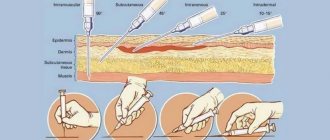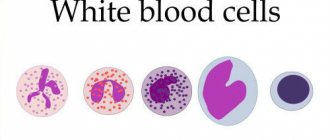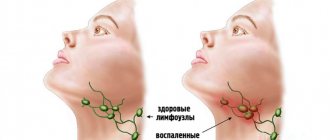Causes of glucose imbalance
There are two types of blood sugar disorders:
- Hyperglycemia: glucose level exceeds 5.5 mmol/l. In persons over 60 years of age, a level of 5.9-6.3 mmol/l is considered normal.
- Hypoglycemia: glucose level below 3.3-3.5 mmol/l.
Each of these conditions has its own causes and provoking factors, which should be discussed separately.
Hyperglycemia
- Diabetes;
- neoplasms in the liver;
- severe neuropsychological stress;
- regular overeating (gluttony);
- lack of B vitamins;
- uncontrolled use of certain groups of medications: antidepressants, β-blockers, diuretics, corticosteroids, etc.
Hypoglycemia
- excessive physical activity leading to excess glucose consumption;
- violations of the rules for taking glucose-lowering medications;
- Irregular meals or poor diet;
- chronic liver, kidney and/or heart failure;
- hepatitis or insulinoma (pancreatic tumor);
- lack of hormones: glucagon, cortisol, somatropin;
- congenital disorders of insulin secretion;
- chronic alcoholism;
- anorexia.
Caution: High Blood Sugar
Diabetes mellitus is a disease in which the level of sugar (glucose) in the blood increases. Currently, the world is experiencing a real epidemic of this disease: every eleventh person on the planet suffers from diabetes, and according to experts, in 2030 every tenth person will be “diabetic”.
High blood sugar is very dangerous. Like corrosion, it “corrodes” all organs. The eyes, kidneys, nerves, and heart suffer the most. Patients with diabetes die from heart attacks, strokes, and lose their vision. They develop kidney failure and have to undergo hemodialysis (blood purification using an artificial kidney) several times a week. Sometimes leg ulcers develop on the legs, leading to amputation.
The most common type is diabetes mellitus. It occurs due to excess weight, a sedentary lifestyle, consumption of large amounts of high-calorie food, and family history. In this case, the body loses sensitivity to insulin, a hormone that is responsible for maintaining normal blood glucose levels.
Type 1 diabetes mellitus is less common. It develops due to a malfunction in the immune system, and the body begins to destroy its own cells that produce insulin. This process is triggered by some viruses (Coxsackie virus, mumps virus), toxic substances (nitroso compounds). Heredity also plays a role in this disease.
How can a person find out if he has diabetes?
Unfortunately, our body does not have a sensory organ that would sense high blood sugar. Therefore, at the beginning of the disease, when blood glucose is still not very high, a person does not feel anything unusual. But at the same time, the harmful effects of glucose on the body are already beginning. Later, when blood sugar becomes high enough, glucose begins to penetrate into the urine, attracting water, and frequent urination appears, followed by thirst. Sometimes these symptoms prompt a person to see a doctor and get a diagnosis.
In some patients, the first symptom of diabetes may be itchy skin (glucose accumulates in the skin and irritates nerve endings) or pustular rashes on the skin, boils.
With type 2 diabetes, symptoms develop slowly, and a person can walk with high blood glucose levels for years, while irreparable damage is already caused to the body. With type 1 diabetes, symptoms, as a rule, develop quite quickly, such as severe thirst, frequent urination, weight loss, and weakness. If help is not provided in time, ketones accumulate in the body, nausea and vomiting, abdominal pain, shortness of breath appear, and the person may fall into a coma.
What to do to avoid getting diabetes?
To prevent the development of the disease, it is necessary, no matter how trivial it may sound, to lead a healthy lifestyle. Do physical exercise, eat right (do not abuse fatty foods, sweets and baked goods, alcohol), observe a work-rest schedule. Have annual medical examinations and have your blood tested for sugar.
If you experience thirst, frequent urination, itchy skin, pustules or boils on the skin, ulcers on the feet, weight loss, or weakness, you need to check your blood glucose level. The normal level of fasting blood glucose from a finger is from 3.3 to 5.5 mmol/l, from a vein up to 6.0 mmol/l. If these indicators are exceeded, you must consult an endocrinologist.
Should I panic if I am diagnosed with diabetes?
Diabetes mellitus is a serious disease that leads to adverse consequences. At the same time, today an endocrinologist has many effective drugs in his arsenal to lower blood sugar levels and treat the consequences of diabetes. Therefore, if you follow your doctor's recommendations, you can effectively manage this disease and live a long and happy life.
Symptoms of hyperglycemia
The following clinical signs indicate elevated blood sugar:
- constant strong unquenchable thirst, often accompanied by a feeling of dry mouth;
- slow healing of wounds, as well as their increased tendency to infection and suppuration;
- frequent urination with small volumes of single urine output;
- regular occurrence of infectious diseases, especially those affecting the mucous membranes (for example, candidiasis);
- causeless loss of body weight;
- decreased visual acuity - sometimes temporary;
- noticeable deterioration in the condition of the skin and hair;
- chronic fatigue, increased fatigue;
- cardiac arrhythmia;
- causeless irritability and nervousness.
How to take glucose tablets
Medicines containing glucose are prescribed for the following conditions:
- poisoning;
- lack of carbohydrates supplied with food;
- dehydration caused by vomiting and indigestion;
- lack of substance in the body.
For diabetes
Medicines are generally not prescribed for diabetes. But there are exceptions when it is urgently necessary to increase the content of an element. Hypoglycemia occurs when there is excessive inulin content.
Medicines can be taken in the form of solutions or tablets. For diabetes mellitus, tablets are the appropriate form according to doctors. The solution should be taken in critical situations.
Signs of hypoglycemia
A decrease in blood sugar levels has fairly clear symptoms, and therefore does not pose any difficulties in diagnosis:
- increased sweating;
- tremor of the limbs;
- high blood pressure;
- chronic tachycardia;
- frequent and causeless nausea;
- constant feeling of weakness, frequent dizziness;
- persistent feeling of hunger;
- pronounced pallor of the skin;
- frequent headaches;
- blurred vision, double vision of visible objects;
- tingling or “ants crawling” sensations throughout the body;
- decreased concentration.
What is glucose used for?
Glucose takes part in metabolism. The brain needs this substance. When there is a lack of sugar in the body, a person experiences a feeling of hunger, which is the first signal.
The benefits of glucose are as follows:
- supplies energy;
- helps fight stressful situations and depression;
- takes part in metabolic processes;
- supports normal functioning of the cardiovascular system;
- has a positive effect on the general condition.
The substance is also useful in the presence of liver diseases.
Where does hyperglycemia come from?
The leading cause of hyperglycemia is type 1 and type 2 diabetes mellitus. The first thing patients do after being diagnosed with diabetes is to go buy a glucometer, as they need to keep their sugar under control.
Glucose levels in all diabetics are elevated for one of two reasons:
- the body lacks insulin, a hormone that “opens” the cells of the human body to glucose. This happens in type 1 diabetes;
- There is enough insulin in the body, but cells show resistance to it (insulin resistance). This is a condition for the occurrence of type 2 diabetes.
Other common causes of hyperglycemia:
You have liver and/or pancreas disease
One of the functions of the liver is to store glucose. This is a reserve that the liver releases into the blood at the right time at the command of the brain. If an organ is damaged, it can release glucose not on command, but at its own discretion. As for the pancreas, things are even simpler here: insulin is produced by the islets of Langerhans, which are part of the gland. If there is something wrong with the organ, insulin production may be disrupted. Hence the fluctuations in sugar levels.
You live in constant stress
Stress is a reaction to a security threat. If the body senses danger, it begins to intensively release sugar into the blood in order to ensure that the organs and tissues are supplied with nutrition. Without physical activity, this glucose is not consumed, so the sugar level in a stressful situation remains high for some time.
If nervous tension is constantly present in life, hyperglycemia is almost guaranteed. It can also develop against the background of infection, inflammation and injury.
You're eating too many carbohydrates
A person needs carbohydrates - from them he draws energy. But an excess of high-carbohydrate foods leads to a steady increase in blood sugar. Of course, if you indulge in sweets once, nothing bad will happen. But buns for breakfast, lunch and dinner are the right path to increased glucose and all the ensuing consequences. Because organs and tissues take from food exactly as much sugar as they need. The rest goes to the liver for storage, and if it doesn’t fit there, it remains in the blood.
The pancreas also has obesity. Is this treatable? Against the background of fatty disease, insulin secretion and sensitivity to it are disrupted, since this hormone is secreted by the pancreas. As a result, diabetes mellitus develops.
What to do if you have hyperglycemia
Naturally, if you suspect that you have high sugar levels, you need to consult a doctor - a therapist or an endocrinologist. The doctor will send you for a blood test and, if hyperglycemia is confirmed, will dig further. Increased glucose is not a cause, but a consequence. To normalize blood sugar levels, you need to figure out where your legs “grow” from.
We have already discussed the possible reasons above, but there are other predisposing factors. For example, some medications can increase the risk of developing hyperglycemia. These include β-blockers, thiazide diuretics, corticosteroids, niacin, phentamidine, protease inhibitors, L-asparaginase, and some antidepressants.
Depending on the origin of hyperglycemia, the doctor will prescribe treatment. In addition to this, you will need to make some adjustments to your lifestyle and diet:
- reduce the size of portions and the amount of fast carbohydrates in the diet. Your choice is slow carbohydrates that increase blood sugar levels gradually and keep you feeling full for a long time.
- move more so that the body “dumps” glucose. True, in some cases, physical activity is prohibited with diabetes. Be sure to consult your doctor about this
- drink more water so that sugar leaves the body in urine
- strengthen your nerves. Learn to protect yourself from stress and relax. After all, who else if not you? To do this, you don’t have to go to an expensive SPA. Buy natural candles, take a warm bath with salt in the evening and turn on relaxing music. Remember: less nerves means lower blood sugar.
What is hyperglycemia
Hyperglycemia is an increase in plasma glucose concentration of more than 6.1 mmol/l on an empty stomach and more than 11 mmol/l two hours after a meal. Accordingly, everything that is less than these values is considered the norm.
Physiological hyperglycemia includes an increase in sugar during pregnancy, during stress and after eating a large amount of carbohydrates. This is a temporary spike in glucose and should not be a cause for concern.
Pathological excess of sugar in the blood is a rather dangerous phenomenon. It would seem, what’s so scary about “very sweet blood”? Will mosquitoes hunt more furiously? Of course, the point is different. Hyperglycemia is both a consequence of health problems and a harbinger of new diseases.
Due to constantly high glucose levels, damage to blood vessels and nerve fibers occurs, which accelerates the progression of atherosclerosis. Subsequently, this can lead to the early development of cardiovascular accidents (acute myocardial infarction, stroke), as well as chronic renal failure, loss of vision, and gangrene of the extremities.
Hidden sugar. What ingredients in products does it hide behind? To control the level of sugar consumption, it is not enough to simply limit the “white powder”. Most store-bought foods contain what is called hidden sugar.








